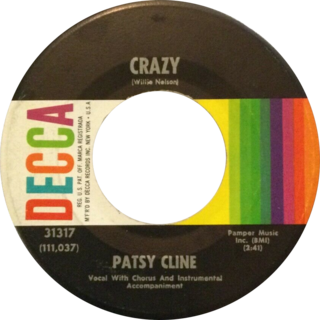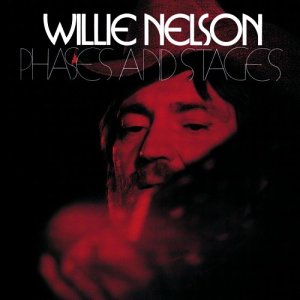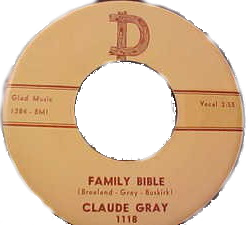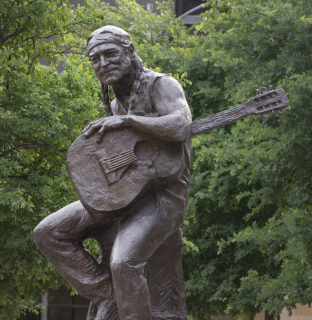
"Crazy" is a song written by Willie Nelson and popularized by Patsy Cline in 1961. Nelson wrote the song while living in Houston, working for Pappy Daily's label D Records. He was also a radio DJ and performed in clubs. Nelson then moved to Nashville, Tennessee, working as a writer for Pamper Music. Through Hank Cochran, the song reached Patsy Cline. After her original recording and release, Cline's version reached number two on Billboard's Hot Country Singles, also crossing to the pop chart as a top 10 single.

Shotgun Willie is the 16th studio album by American country music singer-songwriter Willie Nelson, released on June 11, 1973. The recording marks a change of style for Nelson, who later stated that the album "cleared his throat". When Nelson refused to sign an early extension of his contract with RCA Records in 1972, the label decided not to release any further recordings. Nelson hired Neil Reshen as his manager, and while Reshen negotiated with RCA, Nelson moved to Austin, Texas, where the ongoing hippie music scene at the Armadillo World Headquarters renewed his musical style. In Nashville, Nelson met producer Jerry Wexler, vice president of Atlantic Records, who was interested in his music. Reshen solved the problems with RCA and signed Nelson with Atlantic as their first country music artist.

Phases and Stages is the 17th studio album by American country music singer-songwriter Willie Nelson, released in March 1974. It followed the moderate success of his first Atlantic Records release, Shotgun Willie. Nelson met producer Jerry Wexler at a party where Nelson sang songs from an album he planned to record. The single "Phases and Stages" was originally recorded the same year. Nelson recorded the album at Muscle Shoals Sound Studios in two days and Wexler produced it.

Edwin A. "Bud" Shrake, Jr. was an American journalist, sportswriter, novelist, biographer and screenwriter. He co-wrote a series of golfing advice books with golf coach Harvey Penick, including Harvey Penick's Little Red Book, a golf guide that became the best-selling sports book in publishing history. Called a “lion of Texas letters” by the Austin American-Statesman, Shrake was a member of the Texas Film Hall of Fame, and received the Lon Tinkle lifetime achievement award from the Texas Institute of Letters and the Texas Book Festival Bookend Award.

Yesterday's Wine is the 13th studio album and a concept album by country singer Willie Nelson. Nelson had been recording for RCA Victor since the early 1960s, and had released no significant hit records. By 1970, his recordings had reached mid-chart positions. Nelson lost the money he made from his song-writing royalties by financing concert tours that were generally unsuccessful and unprofitable. In addition to problems with his music career, Nelson had a troubled personal life. He had divorced his wife, Shirley Collie, and his Tennessee ranch had been destroyed by a fire.

My Own Peculiar Way is the ninth studio album by country singer Willie Nelson. It was his last release in the 1960s. Bergen White was the conductor and arranger. This became Willie's first studio album in which he used his new classical acoustic guitar called Martin N-20 that he named "Trigger".

The Party's Over and Other Great Willie Nelson Songs is the sixth studio album by country singer Willie Nelson.

Country Favorites – Willie Nelson Style is the fourth studio album by country singer Willie Nelson. He recorded it with Ernest Tubb's band, the Texas Troubadours and Western Swing fiddler-vocalist Wade Ray with studio musicians Jimmy Wilkerson and Hargus "Pig" Robbins. At the time of the recording, Nelson was a regular on a syndicated TV show hosted by Tubb.

Country Willie: His Own Songs is the third studio album by country singer Willie Nelson. This was Nelson's third album, his first for RCA Victor.

...And Then I Wrote is the debut studio album by country singer Willie Nelson, recorded during August and September 1962 and released through Liberty Records.

Always on My Mind is the 27th studio album by country singer Willie Nelson. It was the Billboard number one country album of the year for 1982, and stayed 253 weeks on the Billboard Top Country Albums charts, peaking at number one for a total of 22 weeks, as well as spending 99 weeks on the all-genre Billboard 200, peaking at number two for 3 weeks.
"Yesterday's Wine" is the title track of the 1971 Willie Nelson album Yesterday's Wine. The track was written by Nelson, and it later became a number 1 duet for George Jones and Merle Haggard in 1982.

Bobbie Lee Nelson was an American pianist and singer, the elder sister of Willie Nelson, and a member of his band, Willie Nelson and Family. When she was five, her grandmother taught her to play keyboards with a pump organ, and after successful appearances at gospel conventions held in Hillsboro, Texas, her grandfather bought her a piano.

"Night Life" is a song written by country music singer-songwriter Willie Nelson. Nelson was inspired to write the song during one of his trips from his home in Pasadena, Texas, to his work, singing at the Esquire Ballroom in Houston.
The Western Express was a country-music radio show transmitted by KCNC in Fort Worth, Texas. The show started in 1947, hosted by disk jockey Charlie Williams. In 1956, the station later hired Willie Nelson, then a struggling singer-songwriter who previously worked on different radio stations. Nelson hosted the three-hour-long show singing his original songs, taking calls and playing records.

"Family Bible" is a song written by country music singer-songwriter Willie Nelson. Nelson began writing the song in 1957, while he enjoyed success as a disc jockey in KVAN, in Vancouver, Washington. After being denied a raise by the station, he moved to Houston, Texas. Due to financial issues he sold the song to Paul Buskirk.

"Mr. Record Man" is a song written by country music singer-songwriter Willie Nelson. After writing the song, Nelson moved to Houston, Texas, where due to his financial issues, tried to sell it to Larry Butler. Butler, who rejected to buy the song, employed Nelson instead. After his original songs turned into hits for other artists, Nelson was signed as a recording artist by Liberty Records.
"The Storm Has Just Begun" is a song by country music singer-songwriter Willie Nelson. Nelson wrote the song at the age of twelve. While working for KBOP in Pleasanton, Texas, in 1955, the song was one of the first two ever recorded by Nelson.

"Willingly" is a duet by American country music singer Willie Nelson and Shirley Collie, produced by Joe Allison during Nelson's third session for Liberty Records. Released in March 1962, the album reached number ten on Billboard's Hot Country Singles.

The Willie Nelson statue, or simply Willie, is a bronze sculpture of singer-songwriter Willie Nelson, located in Downtown Austin, Texas. The statue was commissioned to artist Clete Shields by the nonprofit organization Capital Area Statues.

















